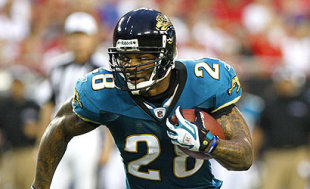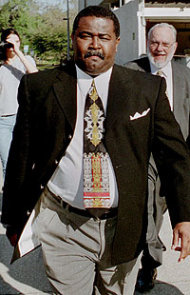Something About Forgiveness

Fred Taylor is a 36-year-old former NFL running back. As a collegian at the University of Florida, he helped the Gators to a National Championship in 1996. As a team captain in his senior year, Taylor earned 1st team All-Southeastern Conference honors, 1st team Walter Camp All-American honors, and his teammates’ nod as Florida’s most valuable player.
In the NFL, Taylor rushed for 11,695 and 66 touchdowns, and caught 290 passes for 2,384 yards and another 8 touchdowns, in 13 seasons, retiring in 2011.
Taylor is doing well. That should surprise no one; talented people who work hard and perform well often translate their skills into material success.

The man with the… aggressive… tie is William “Tank” Black. Black was an assistant football coach at the University of South Carolina before starting Professional Management Incorporated (PMI), a sports agency, in 1988. Black set a record in 1999 for a single agent by signing five of that year’s 31 first-round NFL draft picks, plus three second round draft picks. Within a year of that record, he stood accused of improperly funneling cash to college players, money-laundering, involvement in a Ponzi investment scheme, and of involvement in a stock swindle.
Tank Black represented Fred Taylor when Taylor came out of Florida in 1998…and lost $3.6 million of Taylor’s money to scams by 2000.
Taylor was so distressed that he considered retiring from the NFL in 2001. Black spent 82 months in federal prison for money-laundering. Taylor overcame Black’s betrayal to enjoy a long and lucrative career, and the comfortable position he enjoys today. Tank Black left prison in 2007, and left a halfway house in 2008.
Needless to say, the events caused a rift between the two men. But that’s not the story.
Fred Taylor recently called Tank Black to forgive him and to thank him, indicating it was something he had to do.
When Taylor asked Black, “What happened?” Black said he was misled into a Ponzi scheme. Taylor doesn’t know if he believes that. Black apologized profusely and broke down crying during the call.
“I just sat and listened,” Taylor said. “It didn’t do anything for me. It didn’t do a thing. I thank God for giving me the courage to do it. Men show up.”
THAT is the story.
Intentional or not, Fred Taylor experienced a key truth regarding forgiveness: it does nothing for the one who grants it. It isn’t supposed to. Check out Luke 7:36-47 KJV
The creditor wanted his money returned, but there was none to collect. God wanted obedience in return for His goodness, but the woman disobeyed. No doubt the debtors made an appeal for mercy from their creditor. The woman’s broken and tearful wiping Christ’s feet with her hair is a legendary example of sacrificial love.
However, scripture is clear, And Samuel said, Hath the LORD as great delight in burnt offerings and sacrifices, as in obeying the voice of the LORD? Behold, to obey is better than sacrifice, and to hearken than the fat of rams. (1 Samuel 15:22 KJV)
Clearly, the Lord did not get what he wanted from the woman. While the creditor likely received much love from those who owed him, it is as Ray Charles sang:
Your love gives me such a thrill –
But your love don’t pay my bills –
I need money . . . That’s what I want!
When viewed from that perspective, Fred Taylor’s reaction to Tank Black’s apology and tears is understandable: “It didn’t do anything for me. It didn’t do a thing…”
Again, it’s not supposed to. Tank Black’s remorse can only benefit Tank Black: pride abandons the man offering a sincere apology, and his tears are to cleanse his stained heart. Fred Taylor left open the possibility of another phone conversation and even a face to face meeting with Tank Black. Should either occur, then Taylor’s forgiveness can continue to work on Tank Black.
The only thing Taylor can ever expect to receive is…Tank Black, so says Matthew 18:15. The next 2 verses in Matthew 18 make it clear that forgiveness is not about helping the wronged party cope, but rather about convincing the wrongdoer to repair broken fellowships.
It is never a given that a wrongdoer will acknowledge their wrong, let alone seek forgiveness. It is also never a given that the wronged party will regain whatever was lost. Consequently, it is hardly reasonable to believe that granting forgiveness will benefit anyone other than the wrongdoer. Granting forgiveness does nothing for God; He is no more divine when He forgives, and He is no less divine should He not forgive. As the apostle wrote: For he saith to Moses, I will have mercy on whom I will have mercy, and I will have compassion on whom I will have compassion. (Romans 9:15 KJV)
Forgiveness does nothing for those who grant it; it requires something from them. It requires mercy; it requires compassion. It also requires kindness and a tender heart. These are difficult things for a wronged person to show.
I don’t know what Fred Taylor expected to receive from calling Tank Black; he says it did nothing for him. I for one, never believed it would. But Taylor also thanked God for giving him the courage to make the call. I also thank God for also giving Fred Taylor the mercy, compassion, kindness, and heart to dial a number and listen as the man who stole from him apologized and cried.
Taylor also said “Men show up.” In this case, when there was noting for him to gain, a man most certainly did show up. Thank you, Mr. Taylor.
Copyright 2012. blackmanthinkin.com